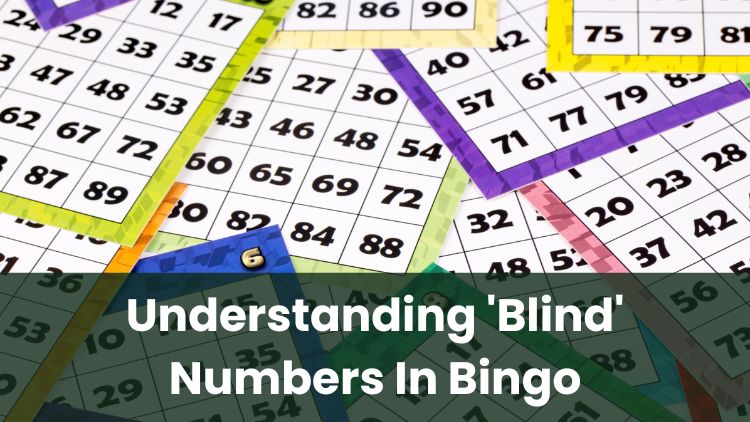
If you’re new to bingo, you might have come across the term ‘blind’ numbers and paused, unsure what it means. While the foundations of bingo are relatively easy to grasp, certain expressions, like ‘blind’, can seem quite puzzling at first.
This article explains what ‘blind’ numbers are, how to spot them on your bingo card, and why they catch attention during a game. Through understanding these terms, you may find yourself following along more confidently, whether you’re playing at home or in a local hall.
We’ll also show how these numbers fit into UK bingo rules and what you might expect as they come up. Feeling ready? Let’s take a closer look.
Where The Term 'Blind' Came From
The term ‘blind’ is a piece of bingo slang with roots in classic British bingo halls. It has nothing to do with eyesight. Here, ‘blind’ refers to numbers ending in zero—such as 10, 20, 30, and all the way through to 90 in the version of bingo usually played in the UK.
Bingo callers would use phrases like “one-oh, blind ten” instead of just saying the number, making these stand out for players who needed to try and keep up in often-lively atmospheres. This helped avoid confusion, especially when numbers sounded similar or the hall was noisy.
These traditions have lasted. While some of the terms are less used in online bingo, you’ll hear ‘blind’ numbers called out at plenty of venues today, keeping ties to the heritage of British bingo and making games memorable for new and returning players.
Blind Numbers – Which Ones Count?
In UK bingo, a ‘blind’ number is any number that ends with a zero. These stand out on your card, as they’re easy to spot within the grid.
The main blind numbers, as outlined earlier, are: 10, 20, 30, 40, 50, 60, 70, 80, and 90. These are the only ones that are announced with ‘blind’ in traditional 90-ball bingo games.
Looking at a UK bingo ticket, you might notice each column relates to a set of ten numbers, and the final number of each set (ending in zero) is a blind number. It’s common for a caller to use special phrases for these, which may bring extra energy to the game and help players quickly recognise what’s just been called.
Every number—blinds included—is drawn by chance in the game. Knowing what blind numbers are won’t change your chances of potentially winning, but it can make it easier to follow the game and keep track of what’s being called.
Other Quirky Bingo Callouts
Bingo is known for its memorable phrases. Aside from blind numbers, you’ll hear many classic sayings called out in British bingo halls. They’re designed to make numbers easier to spot and to bring a sense of fun.
Here are a few you might hear:
-
Two Little Ducks – 22
-
Key of the Door – 21
-
Legs Eleven – 11
-
Kelly’s Eye – 1
-
Clickety Click – 66
-
Half a Century – 50
-
Top of the Shop – 90
-
Tom’s Thumb – 51
-
Doctor’s Orders – 9
-
Three Dozen – 36
-
Duck and Dive – 25
Some phrases are used more in certain regions, while others can pop up everywhere. Callers often have personal favourites, so you may notice different twists from one venue to another. This rich mix is one of the things that gives bingo much of its friendly, welcoming atmosphere.
The Impact Of Lingo In Bingo Halls
Bingo halls across the UK have built their own language that sets them apart. Phrases, nicknames, and bingo slang are all part of this playful banter. Callers may use rhymes and quirky sayings to make each number clear and memorable, helping the flow of the game.
This lingo can be incredibly helpful, especially at busy tables. Recognising a specific callout means players don’t miss out, even if some numbers sound alike. It can take a few games to get used to the language, but you’ll soon find yourself picking up on the common patterns.
Each hall may have local sayings, too—special to their community, or even inspired by events or funny stories. New players and regulars alike usually enjoy these touches, as they can make games more entertaining and help everyone stay involved.
While the lingo has its roots in tradition and community, it’s worth remembering that bingo relies on random number draws. Clever callouts and unique phrases may help bring players together, but don’t impact your chances of winning.
Play Bingo at Clover Casino
Clover Casino is regulated by the UK Gambling Commission (UKGC), so you can participate knowing that fair play and player protection are prioritised. Our site has a range of familiar games, including bingo and slots, so you can easily browse what’s on offer.
Interested in taking a look? You can log in to Clover Casino with your account, or register as a new player in just a few steps. Clear game categories and handy guides are available, making it straightforward to see what might suit you.
Always remember to take regular breaks and set sensible limits for yourself. If you would like support or advice, you can reach out to BeGambleAware.
*All values (Bet Levels, Maximum Wins etc.) mentioned in relation to these games are subject to change at any time. Game features mentioned may not be available in some jurisdictions.
**The information provided in this blog is intended for educational purposes and should not be construed as betting advice or a guarantee of success. Always gamble responsibly.
